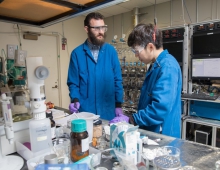
Researchers Work on Next-generation Batteries for Large-scale Energy Storage
Scientists from the Imperial College London have won a 1.5 million euro (1.64 million U.S. dollars) grant from the European Research Council (ERC) to further advance their research into cost-effective redox flow batteries, which are large energy storage devices that could power cities.
A typical flow battery consists of two tanks of electrolytes which are pumped past a membrane held between two electrodes. The membrane separator allows ions to transport between the tanks while preventing the cross-mixing of the electrolyte solutions.
Dr. Qilei Song from Imperial College's Department of Chemical Engineering won the ERC Starting Grant. The goal is to design and manufacture next-generation low-cost ion-selective membranes, based on nanoporous polymers with well-defined porosity and ion-conductive functionality. Highly conductive and selective membranes will improve the efficiency and lifetime of flow batteries for energy storage.
Battery
He said the research could help accelerate developments in renewable energy, mitigate climate change and solve the mismatch between intermittent supply of renewable energy and the variable power grid.
The project will involve collaborations with researchers at Imperial, University of Edinburgh, University of Cambridge and institutions in the EU and China.
Currently, the cost of the membrane used in making flow batteries is still very high, so Dr. Song's team is aiming to design and manufacture next-generation low-cost ion-selective membranes based on nanoporous polymers with well-defined porosity and ion-conductive functionality.
“This grant will enable me to expand my team and move into new areas to pursue ground-breaking fundamental research in renewable energy conversion and storage. Our research will have a great impact for the development of renewable energy such as solar and wind power as well as the hydrogen economy, and contribute to sustainable development in Europe and the World,” Dr. Song said.

















